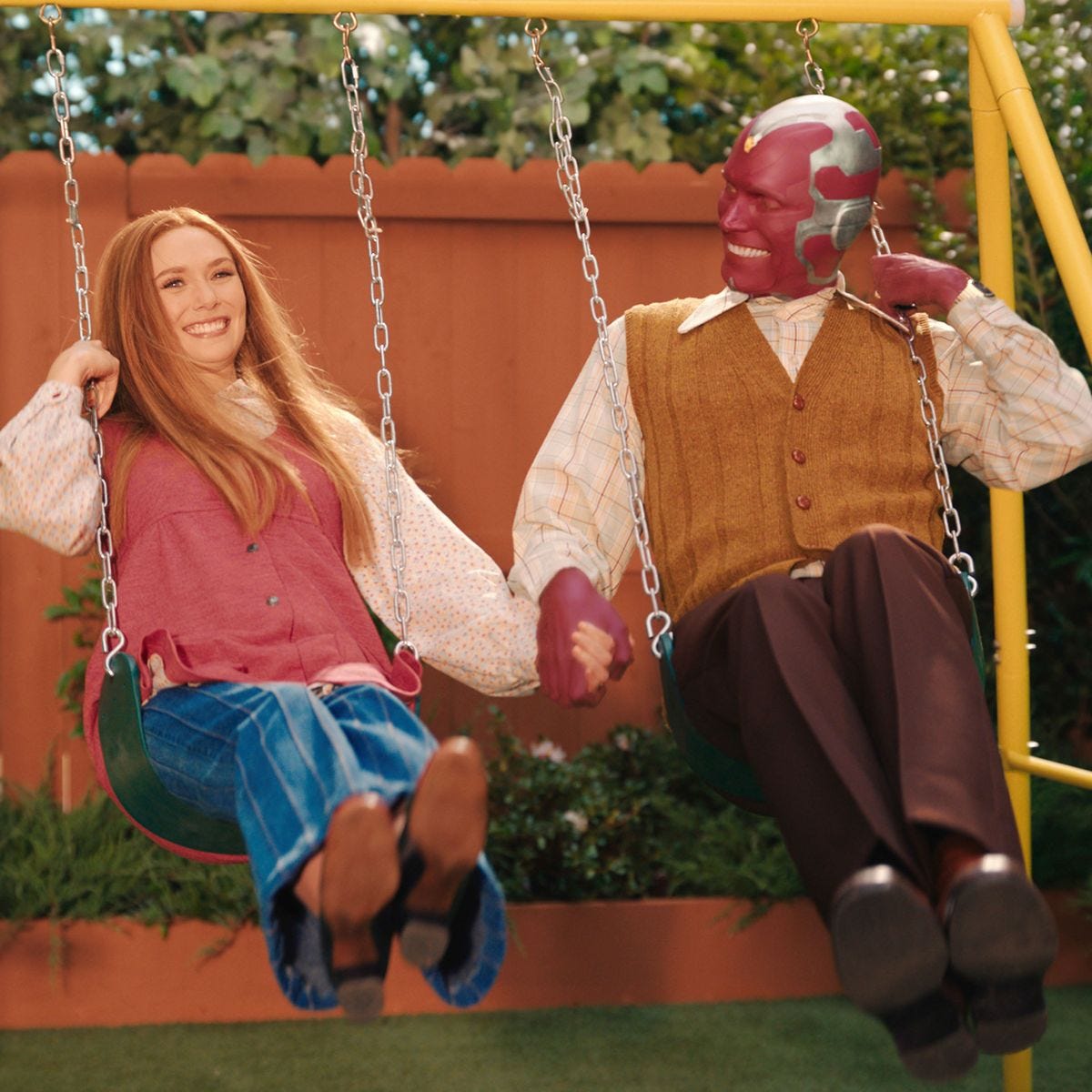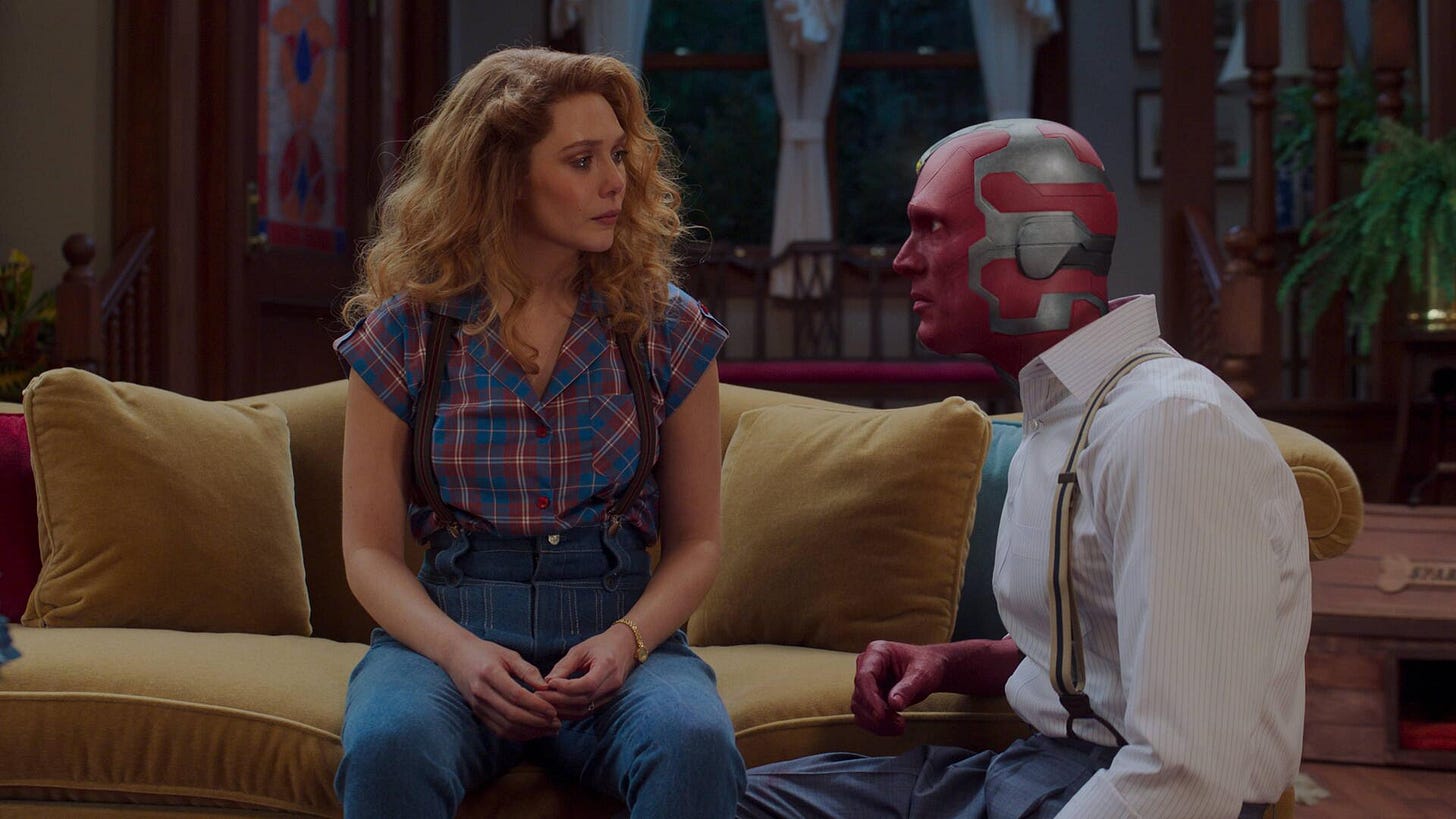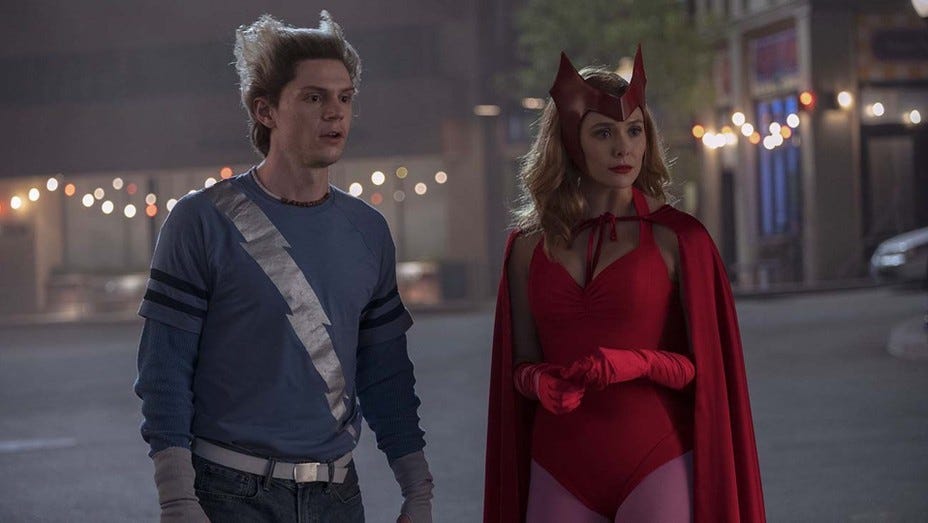On WandaVision
Spoilers ahoy.
When I started writing this essay, I was having a difficult time finding my way into my own arguments. The short version is that I found WandaVision to be well-acted and wholly disappointing. But the long version is where I struggled. I eventually was asking myself, “What did I want out of this show?” But that question turned into “How would this show have ended in a way that would have satisfied me?”
But then I burrowed into the core question: “What will it look like when the Marvel Cinematic Universe concludes?”
What would that look like, do you think? What does an ending to the MCU look like? Right now, you scoff. The MCU will never end, you think. But it will. All things come to an end, and as hard as it is to imagine, there will come a time in the history of popular culture when superhero movies aren’t everything. (He said the same week that both HBO Max and Disney+ are bringing new superhero content to your eyeholes. I know.)
Over the last decade, I have gravitated most to the stories within the Marvel Cinematic Universe that seem the least beholden to the Marvel Cinematic Universe, if that makes sense. Black Panther. Guardians of the Galaxy. The original Iron Man. For one reason or another, these films don’t require you to know about the entire MCU, in one case because there was a very real chance that we’d never get the entire MCU. Does it help you to know about the backstory of Star-Lord? Sure. But you don’t need to know it to enjoy James Gunn’s first film. Does it help to know about the events of Captain America: Civil War? Sure. But you don’t need to know to enjoy Black Panther.
You need to know a lot, I would argue, to fully latch onto WandaVision, as you do for lots of these films. As I see article after article sail through my Twitter feed, touting Easter eggs within the show, possible fan theories, etc., I am left with the same thought: this feels like work.
It’s not that I tacitly refuse to watch shows that have thriving fan communities or bubble up with crazy theories that may never come true. One of my all-time favorite shows was Lost, which was the 21st-century patient zero of such shows. (It didn’t come first — that would be Twin Peaks, if not something further back like The Prisoner.) I loved that show right to its finale, even as many of its theories never came to light and some of the show’s creative staff encouraged such theorizing while knowing it would be for naught.
Most times when I watch an MCU product, I want to enjoy it (in part because why would I watch anything I don’t want to enjoy?). And most times when that product is completed, I feel like Charlie Brown, having just failed to kick the football again. Or, if you like, I feel like Michael Bluth opening up a bag that warns of a dead dove inside, looking into the bag, and then dryly saying, “Well, I don’t know what I expected.” (In a staggering coincidence, that episode was directed by Anthony Russo of the Russo Brothers, fresh off their work in the MCU as well as the now-heavily lauded film Cherrk. I can’t wait to see Cherrk, you guys.)
Kidding aside, I don’t really know what I expected with WandaVision. I was struck by the careful attention paid to the set design and costumes throughout the first few episodes — they really tried their damnedest to make these episodes look like The Dick Van Dyke Show, I Dream of Jeannie, etc. I was almost equally struck by how the first few episodes, in Perd Hapley’s phrasing, had the cadences of jokes without actually being funny.
“Yes, because the show is actually very sad from the start, because it is about grief,” is what you are saying to your screen now. And that’s true, as a line of dialogue that everyone on Twitter has chimed in about tells us. What’s also unfortunately true for me — and I am now as I was at the start of the show, or I feel like I am, in a minority about this show, I know — is that basically none of it works for me. It’s not the performances. Elizabeth Olsen and Paul Bettany are excellent actors, and they are both firmly committed to making you feel for Wanda and Vision. They’re putting in the work.
And yet, it comes back to something I wrote above. You may have noticed I referred to MCU “products”, not “films” or “shows” or “IP-driven content” or whatever you like. I think the core issue I have is that there are very few characters in the MCU I care about, because they often do not feel like characters but cogs in a larger grinding machine intent on achieving…well, continued use of the machine. It’s hard for me — as a non-comic-book reader — to care so much about cogs, especially when it becomes clear that those cogs have what feels like an infinite lifespan.
Much has been talked about how this series, and perhaps even the next one, is about the emotional trauma and fallout of the Blip or the Snap or whatever. But here’s the problem with the Blip or the Snap or whatever: it’s the unwillingness to end things writ large. Vision, as I am sure you recall, died in one of the last two Avengers movies. He’s dead! No, really, he is! But now he’s back in WandaVision. Until we learn he’s not really! But also, he just got cloned! Now he’s bad! Except…maybe he’s not.
The point is, he’s not really dead because no one in these movies is ever really dead. There’s always the next story, because there’s always the next use of the Marvel Machine in which the appropriate cogs will be put to the test to push things forward, just enough.
It also doesn’t help that some of the details within WandaVision felt…let’s just say reverse-engineered. (Please note, again: I haven’t read the comic books. It’s not an active refusal, I just…haven’t. Maybe this stuff is in the comic books. I don’t know.) Why are Wanda and Vision stuck in a sitcom world? Because Wanda used her magic as she grieved Vision’s death to bring him back and create a safe haven for them to live out a domestic fantasy fueled by…her love of the American sitcoms she watched via DVDs that her dad used to sell in Sokovia. (Different strokes for different folks. Some of you may have no problem with that chain of events. I…did.)
Who is the friendly neighbor Agnes? Why, she’s actually a very powerful witch who’s been around for hundreds of years and was behind everything all along? …Except, no, she wasn’t, she just happened to be in Westview hanging out with a guy who happens to look like the version of Wanda’s brother from the Fox series of X-Men movies.
There was a lot of that for me in the last few episodes, which felt somewhat rushed because they apparently were. (I’m always glad to see Randall Park and Kat Dennings get work, and I hope they were well compensated for their bare-minimum appearances in the finale.) But there wasn’t enough grappling with the horror of what Wanda did to a town full of mostly innocent people. Instead, we hear from Monica Rambeau that if it was her in the same position, she’d do the same thing and so would anyone else, and to quote one of the great films, I’m not 100% sure I agree with her police work there.
Anyway. Why write this? Marvel is the monoculture now, as a few folks have pointed out. They are here to stay. And for now, they sure are. I think we’re entering a fascinating transitional period for Marvel, because we’re in the tail end of a series that succeeded on the tailwinds of early successes. Now Marvel may have the cultural cachet to get weird. Or people may scratch their heads at things like The Eternals, because it has no familiar faces from previous MCU films.
Why write this? Because if Marvel is the monoculture, and if their influence will be keenly felt for years to come, then it’s valuable to talk about this machine in ways that aren’t always about lifting it up for existing and seeming to respond to the shifts in cultural winds over time.
If you liked WandaVision, good on you. I envy you for getting more out of the show than I did. But it can withstand criticism. The monoculture as a whole can withstand criticism. Or else it’s an awfully fragile machine.








